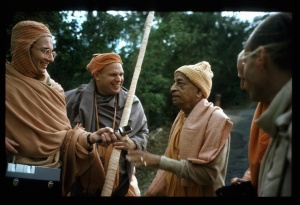SB 4.4.31: Difference between revisions
m (1 revision(s)) |
(Vanibot #0018 edit: make synonym terms in Sanskrit italic in SB - Vanisource) |
||
| Line 1: | Line 1: | ||
{{info | {{info | ||
|speaker=Maitreya | |speaker=Maitreya Ṛṣi | ||
|listener=Vidura | |listener=Vidura | ||
}} | }} | ||
[[Category:Srimad-Bhagavatam - Canto 04 Chapter 04]] | |||
[[Category:Bhagavatam Verses Spoken by Maitreya Rsi - Vanisource|040431]] | |||
<div style="float:left">'''[[Srimad-Bhagavatam]] - [[SB 4|Fourth Canto]] - [[SB 4.4: Sati Quits Her Body|Chapter 4: Satī Quits Her Body]]'''</div> | |||
<div style="float:right">[[File:Go-previous.png|link=SB 4.4.30]] '''[[SB 4.4.30]] - [[SB 4.4.32]]''' [[File:Go-next.png|link=SB 4.4.32]]</div> | |||
{{RandomImage}} | |||
==== TEXT 31 ==== | ==== TEXT 31 ==== | ||
<div | <div class="verse"> | ||
vadaty evaṁ jane satyā | :vadaty evaṁ jane satyā | ||
dṛṣṭvāsu-tyāgam adbhutam | :dṛṣṭvāsu-tyāgam adbhutam | ||
dakṣaṁ tat-pārṣadā hantum | :dakṣaṁ tat-pārṣadā hantum | ||
udatiṣṭhann udāyudhāḥ | :udatiṣṭhann udāyudhāḥ | ||
</div> | </div> | ||
| Line 16: | Line 22: | ||
==== SYNONYMS ==== | ==== SYNONYMS ==== | ||
<div | <div class="synonyms"> | ||
''vadati''—were talking; ''evam''—thus; ''jane''—while the people; ''satyāḥ''—of Satī; ''dṛṣṭvā''—after seeing; ''asu-tyāgam''—the death; ''adbhutam''—wonderful; ''dakṣam''—Dakṣa; ''tat-pārṣadāḥ''—the attendants of Lord Śiva; ''hantum''—to kill; ''udatiṣṭhan''—stood up; ''udāyudhāḥ''—with uplifted weapons. | |||
</div> | </div> | ||
| Line 23: | Line 29: | ||
==== TRANSLATION ==== | ==== TRANSLATION ==== | ||
<div | <div class="translation"> | ||
While people were talking among themselves about the wonderful voluntary death of Satī, the attendants who had come with her readied themselves to kill Dakṣa with their weapons. | While people were talking among themselves about the wonderful voluntary death of Satī, the attendants who had come with her readied themselves to kill Dakṣa with their weapons. | ||
</div> | </div> | ||
| Line 30: | Line 36: | ||
==== PURPORT ==== | ==== PURPORT ==== | ||
<div | <div class="purport"> | ||
The attendants who came with Satī were meant to protect her from calamities, but since they were unable to protect their master's wife, they decided to die for her, and before dying they wanted to kill Dakṣa. It is the duty of attendants to give protection to their master, and in case of failure it is their duty to die. | The attendants who came with Satī were meant to protect her from calamities, but since they were unable to protect their master's wife, they decided to die for her, and before dying they wanted to kill Dakṣa. It is the duty of attendants to give protection to their master, and in case of failure it is their duty to die. | ||
</div> | </div> | ||
__NOTOC__ | |||
<div style="float:right; clear:both;">[[File:Go-previous.png|link=SB 4.4.30]] '''[[SB 4.4.30]] - [[SB 4.4.32]]''' [[File:Go-next.png|link=SB 4.4.32]]</div> | |||
__NOTOC__ | |||
__NOEDITSECTION__ | |||
Revision as of 20:52, 30 November 2017

A.C. Bhaktivedanta Swami Prabhupada
TEXT 31
- vadaty evaṁ jane satyā
- dṛṣṭvāsu-tyāgam adbhutam
- dakṣaṁ tat-pārṣadā hantum
- udatiṣṭhann udāyudhāḥ
SYNONYMS
vadati—were talking; evam—thus; jane—while the people; satyāḥ—of Satī; dṛṣṭvā—after seeing; asu-tyāgam—the death; adbhutam—wonderful; dakṣam—Dakṣa; tat-pārṣadāḥ—the attendants of Lord Śiva; hantum—to kill; udatiṣṭhan—stood up; udāyudhāḥ—with uplifted weapons.
TRANSLATION
While people were talking among themselves about the wonderful voluntary death of Satī, the attendants who had come with her readied themselves to kill Dakṣa with their weapons.
PURPORT
The attendants who came with Satī were meant to protect her from calamities, but since they were unable to protect their master's wife, they decided to die for her, and before dying they wanted to kill Dakṣa. It is the duty of attendants to give protection to their master, and in case of failure it is their duty to die.